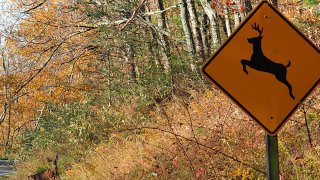
As sunsets continue to get earlier in the Chicago area, residents are beginning to prepare for the end of daylight saving time at the start of next month, though the time change may have effects on much more than our sleep.
The clocks "falling back" one hour at the start of November may also have an impact on deer, with crashes involving the animals typically more common in between October and December.
The increased risk for collisions in particularly pronounced in the Midwest, with one in 60 insurance claims filed in 2022 and 2023 involving animals in Wisconsin, according to a 2023 StateFarm report.
The report named Wisconsin, along with Michigan, Iowa, Minnesota and Missouri as "high-risk" states for animal collisions, while Illinois was listed as "medium-risk."
In 2021, more than 14,500 motor vehicle crashes involved deer in Illinois, a press release from the Illinois Department of Natural Resources said. 42% of those crashes took place between October, November and December, the agency said, with November being the highest-risk month.
“October through December is deer breeding season, and these large animals won’t think twice about crossing busy roads in their search for mates, especially around dusk and dawn,” DuPage County Forest Preserve District ecologist Brian Kraskiewicz added in a release.
Since deer are crepuscular -- meaning that are most active at dawn and dusk -- most accidents involving deer occur between the hours of 5 p.m. to 10 p.m., and 5 a.m. to 8 a.m., the INDR said. And, some studies have shown that collisions also rise when daylight saving time ends, as animals often keep their routines despite clocks being set back."
Local
"Animals, of course, stick to their pattern no matter what human clocks say, going about their lives even as traffic patterns shift to an hour 'earlier' and causing more driving at dusk," a report from Car and Driver said. "Moving our clocks in November increases the amount of low-light traffic, which puts more deer and vehicles at risk. The potential for deer-vehicle interactions is already increased in November because that's when white-tailed deer (and some other ungulates) have their short breeding season."
Although not all deer-vehicle collisions can be prevented, the INDR recommends taking these steps to avoid an accident:
Feeling out of the loop? We'll catch you up on the Chicago news you need to know. Sign up for the weekly Chicago Catch-Up newsletter.
- Pay attention to deer crossing signs and scan the roadsides for the “eyeshine” of deer (reflection of headlights in the deer’s eyes)
- At night, use your high-beam lights when appropriate. This may allow you to see the deer a few seconds earlier, giving you enough time to avoid an accident
- Slow down and prepare to stop if a deer is near the side of the road—there are likely more deer nearby. Deer will often follow one another single file across a road. Trying to cross through the middle of such a group often results in deer colliding with the side of the vehicle
- Be prepared for the unexpected. Deer may stop in the road or decide to double back to the side of the road. Hard pavement provides poor traction for deers’ hard, sharp hooves. They may slip or even fall down.
- Warn other drivers. If there are deer near the road, slow down, honk the horn in short bursts and flash the headlights. Tap the brakes or use the emergency flashers to alert other drivers. Prepare to safely stop if the deer move toward the roadway.
- If there are deer on or approaching the road, do not slam on the brakes or swerve sharply to avoid the deer. It is instinctual to do this, but doing so may cause a loss of control of the vehicle and a more severe accident.
- Never tailgate. Always leave plenty of room between vehicles. Many severe deer vehicle accidents are caused when another vehicle becomes involved.
What to do if you hit a deer while driving in Illinois
According to the INDR, drivers should follow the following steps if a deer is hit:
1. Pull the vehicle off onto the shoulder of the road and turn on the emergency flashers.
2. Do not get out of the vehicle to check on an injured deer or to pull a dead deer from the road. Do not risk being hit by another motorist.
3. Call 911 to report the accident. They will dispatch the appropriate law enforcement officials to assist at the site. Illinois law requires reporting of accidents that result in $1,500 or more in damage; additionally, an accident report must be filed.



